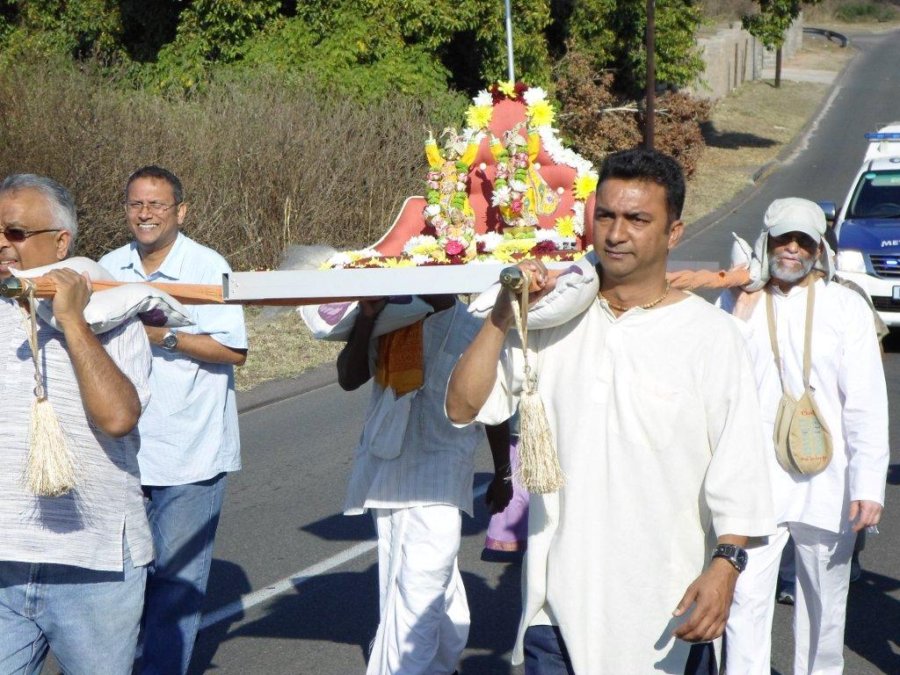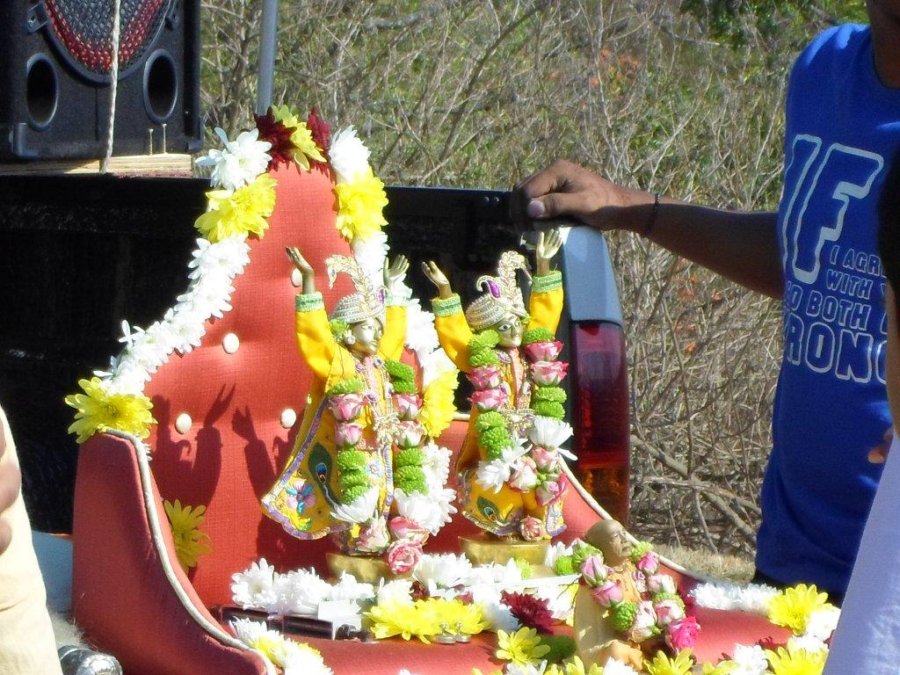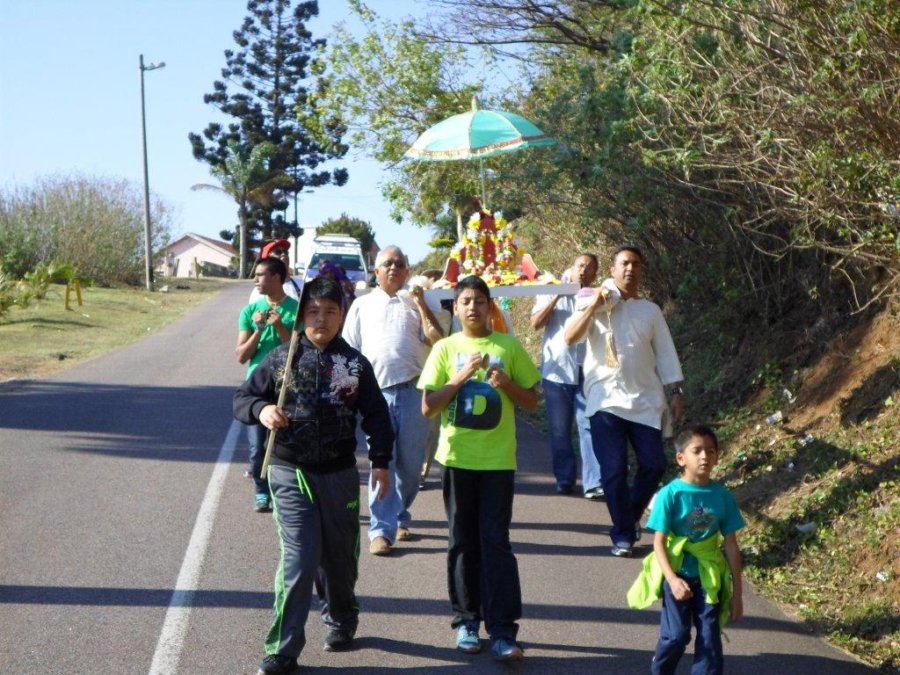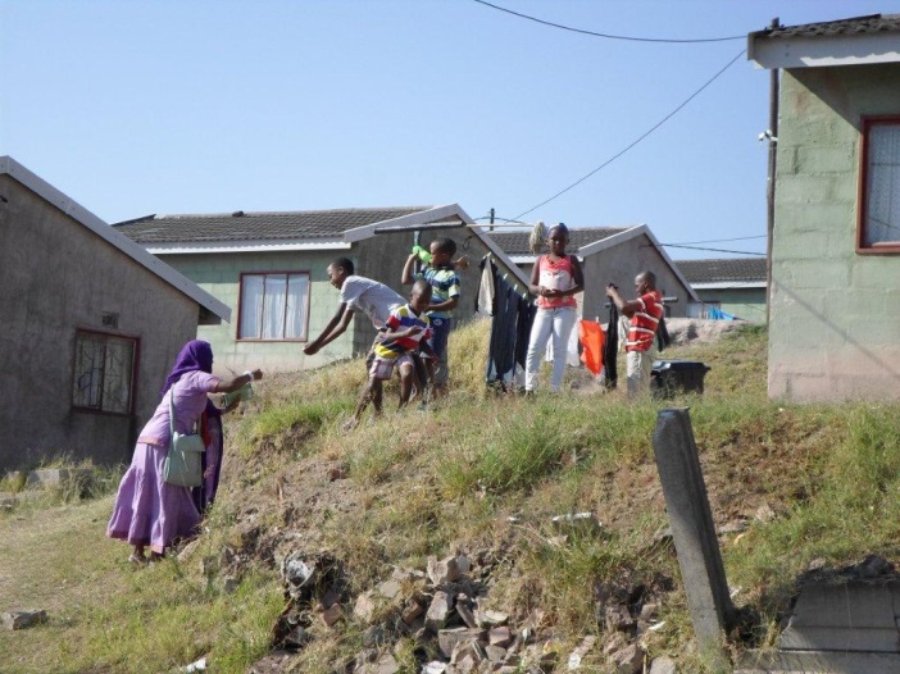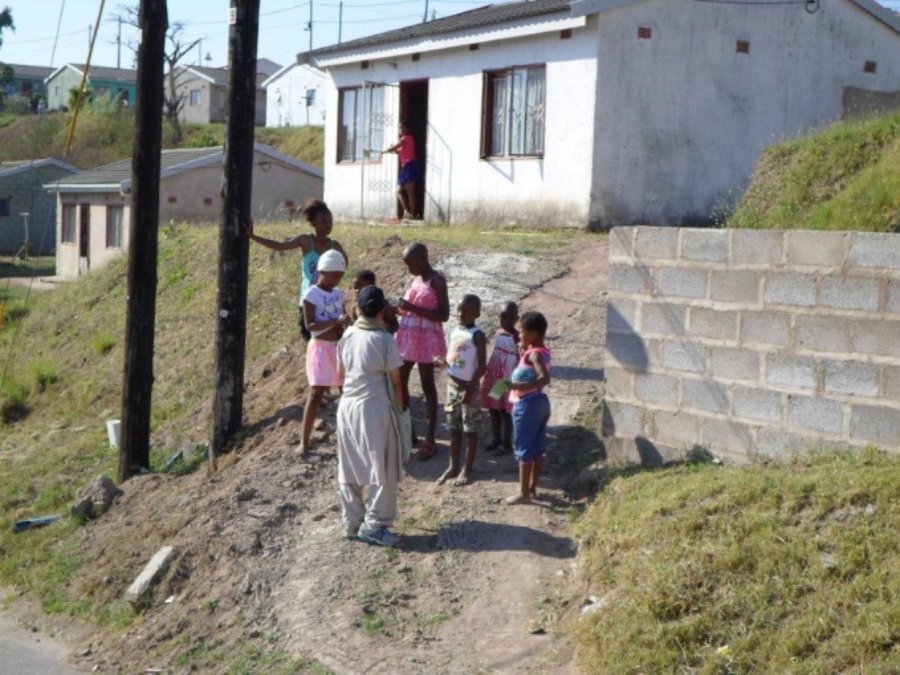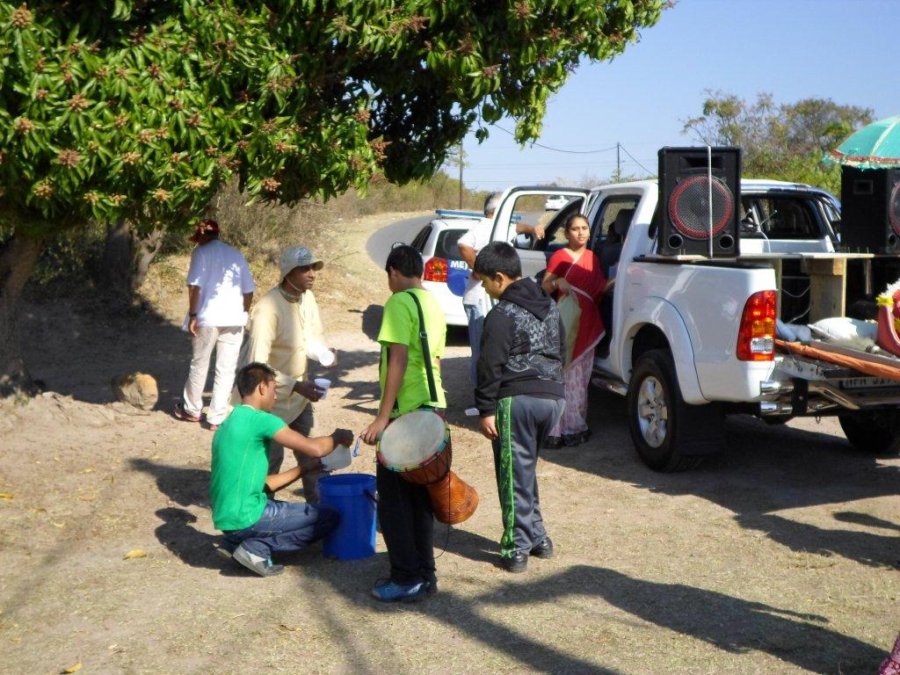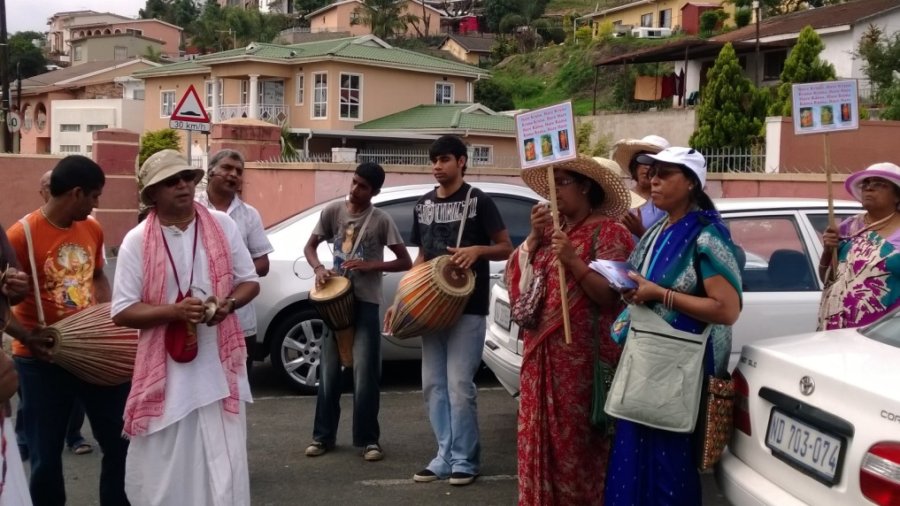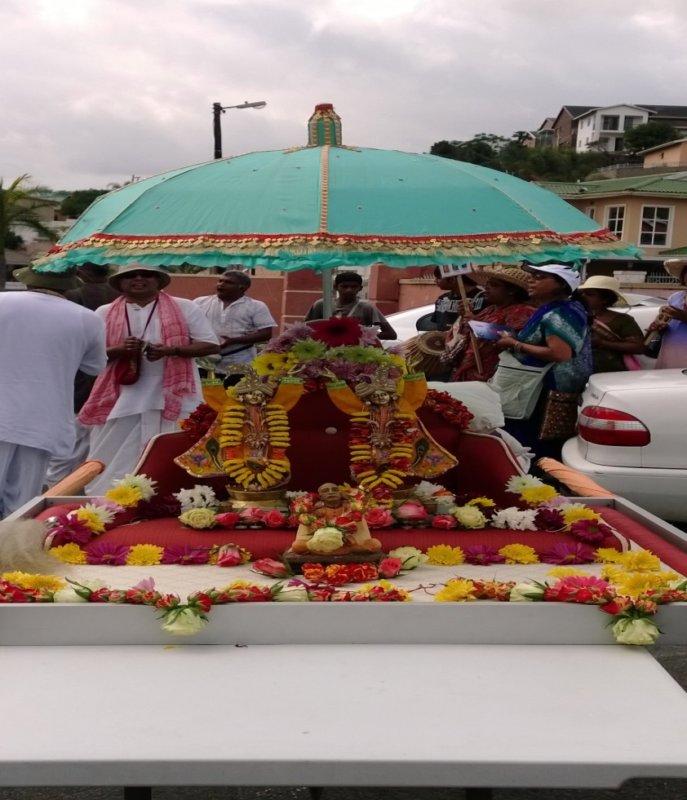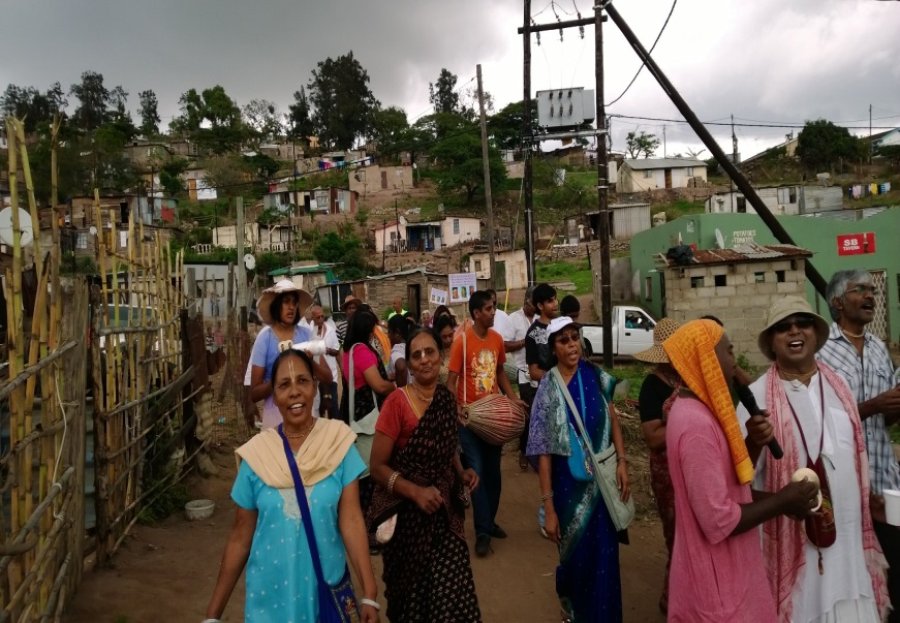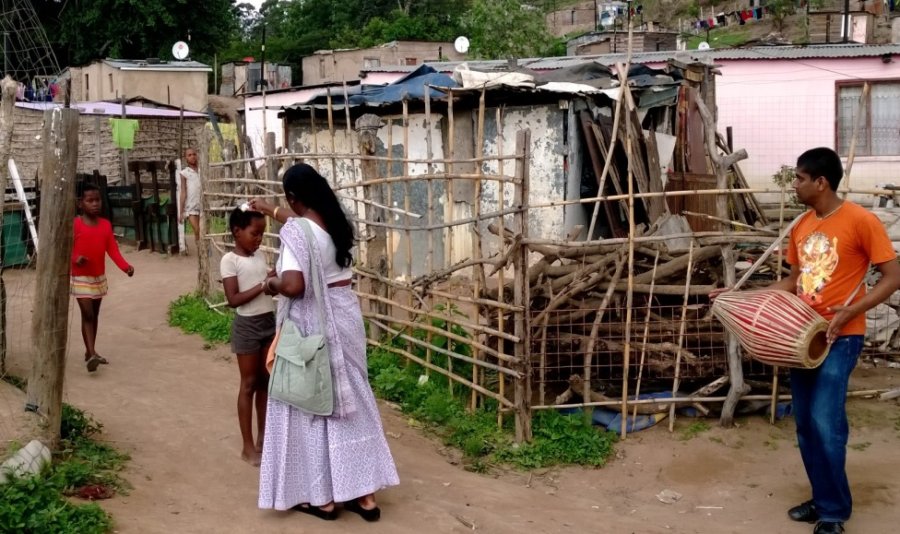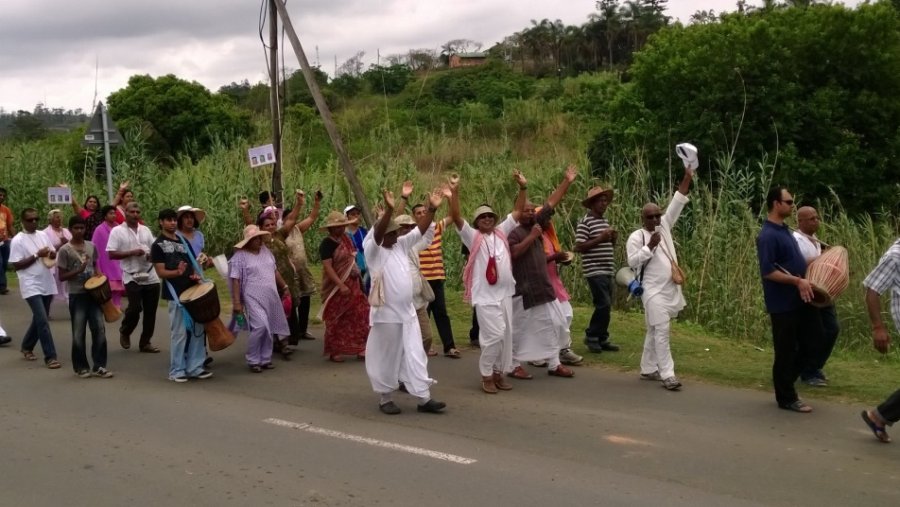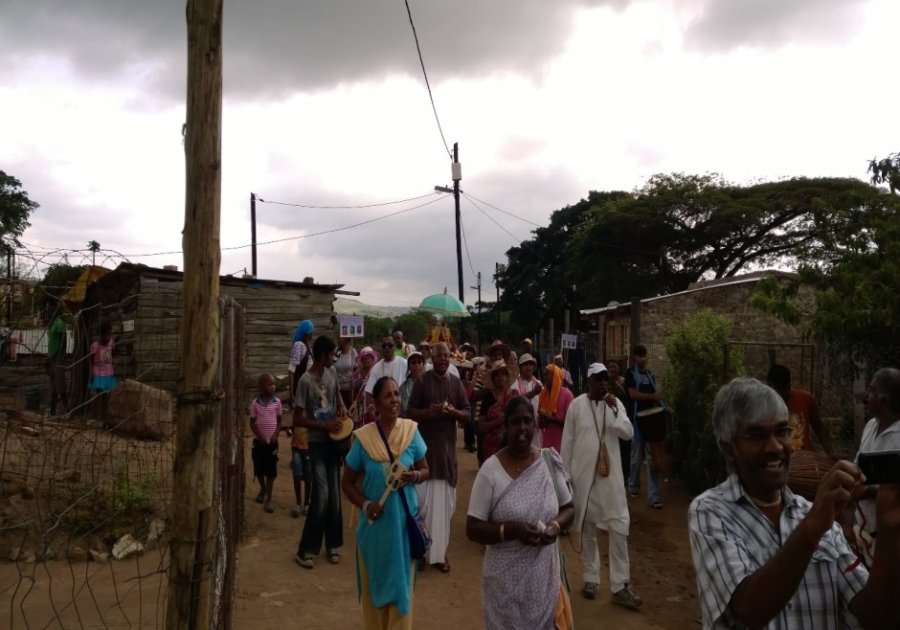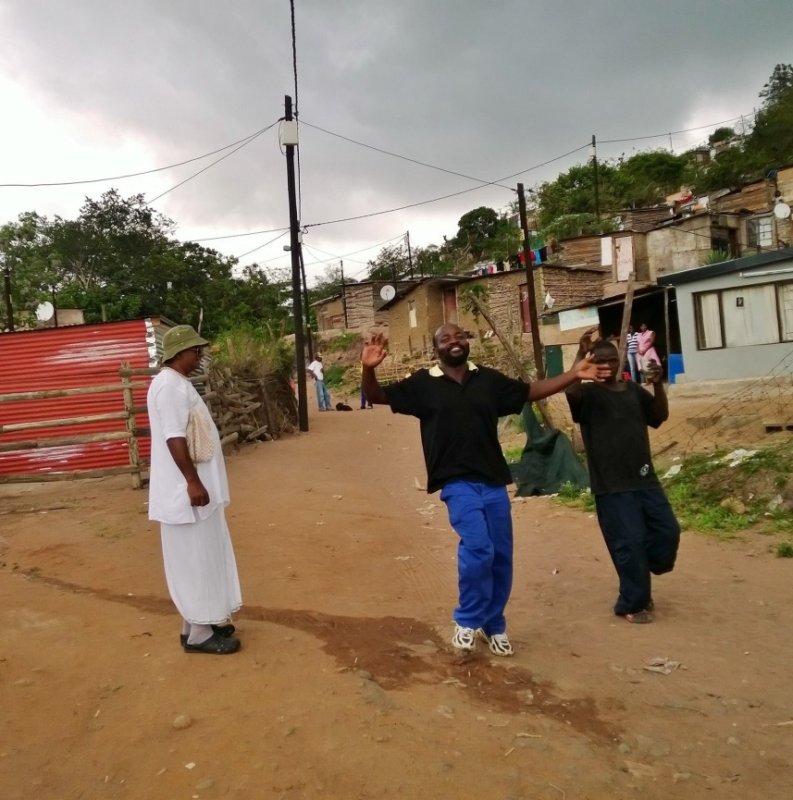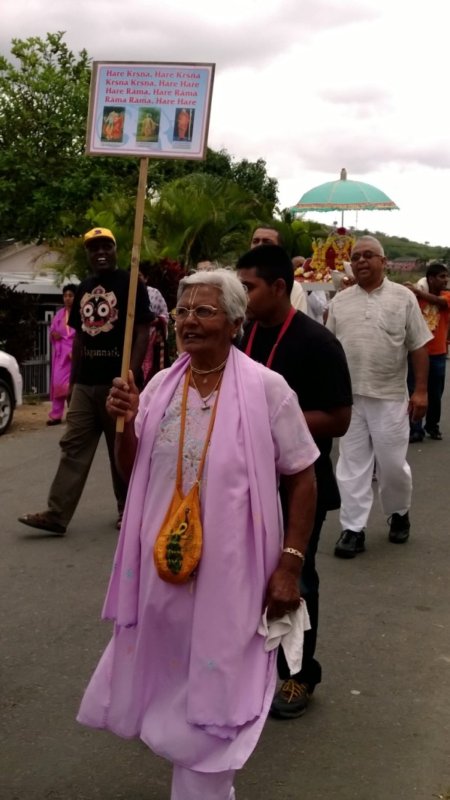In 2014 two padayatras were held in KwaZulu Natal – one in July near the Durban temple and the other in October further north. Both of them started in rather affluent areas and were designed to finish in the poorer section of the town/district.
Burlington Heights : giving mercy to the poor in a high crime area
On July 5th a group of devotees embarked on a padayatra about six kilometers from the Sri Sri Radha Radhanath temple of Understanding in Durban. The devotees, largely disciples of Lokanath Maharaja, undertook this spiritual walk as part of the celebration of their Guru Maharaja’s forthcoming vyasa-puja.
The padayatra started in the affluent area of Burlington Heights, an exclusive suburb that boasts opulent homes with lavish designs. Our chanting in this area did not draw out the people although a few endeavored to take a peek. Of course the high security walls meant to protect its residents from theft to their property insulated them from any sounds on the street. After a short downhill walk, we entered the poor area which stands in obvious contrast to the palatial homes and well maintained roads which we left behind us. In the same area the divide between the rich and poor sections is very stark- one has just to walk about 400 meters to see a huge difference. The area that we were targeting is mostly populated with low cost housing for the unemployed and the poor. It is predominantly occupied by the black African community and the main purpose of this padayatra was to get the devotees to preach to this community. Unfortunately the area is not safe and the necessary arrangements for police escort and private security had to be made prior to the event. Crime in this area is rife and people have been killed for simple items like cell phones and shoes. Our police escort consisted of two vehicles with four police officers clad in official police uniform. Generally police officers carry batons and guns, which they did on this padayatra. Although we felt safe in the presence of our Gaura Nitai Deities, we had to take precautions to protect the devotee who undertook this padayatra, especially the children and older devotees.
The transcendental chants cut through the crisp morning air and within seconds the little children had come out from their homes driven by curiosity. A few of them walked alongside the chanting party, others clapped spontaneously while the rest looked on, intrigued at the sight before them. This was clearly a first and the sweets and books were received with cupped hands and bended knees. Devotees distributed about 50 books –Srila Prabhupada’s books translated into isiZulu, the name of the language spoken by the African citizens in KwaZulu Natal.Children also understand English as they attend the local school where English is the language of instruction.As the books and sweets were being distributed, unhurried mothers coaxed their children to participate in the offering of sweets. Even the dawdling man, slumped on the roadside, after a night of revelry, glanced quizzically at the deities. As we meandered our way across the streets, we noticed the luscious vegetables growing in small garden patches before the homes. Equally interesting were the homes and roadside industries which comprised of car wash and repair facilities, tuck shops filled with an array of goods and tables with fresh green vegetables for sale such as spinach, potatoes and tomatoes – staple food for most. Tuck shops are little shops operating from people’s homes – they build a small section alongside their home and stock it with daily goods like bread and cakes. Many of these home owners are employed by factories and also as maids/helpers.
Clearly, with this padayatra, we had touched the residents of Burlington Heights in a distinct way, and importantly negotiated SrilaPrabhupada’s books into the modest homes of the underprivileged and hopefully into their hearts.
Food for Life in full action in Verulam
On the Friday before the padayatra, the much needed summer rains had arrived in their glory– the dark skies simply exploded and the continuous rains were most welcome after an extremely dry winter in Durban. We eyed the weather and followed its changing patterns closely, in some anxiety about the next day. Saturday, October 25, was reminiscent of the colour of Shyamasundar as the thick dark “monsoon” clouds circled above us threatening rain over the 2.5 kilometer route. Set in the midst of lush sugarcane fields, Verulam was the next site for our Kartik padayatra. The period of Kartika was fast drawing to a close and we were prompted into action to fulfil our goal to plan a padayatra event during this auspicious period.
Verulam is a town 28 kilometres north of Durban in KwaZulu-Natal. Although it is mainly inhabited by Indians, over the years it has fast become populated by other race groups. There is also a growing African population who have moved in and settled informally in this area. We were told about an interesting site, the Sri Gopalal Hindu Temple which was opened in 1913 by Mahatma Gandhi. It would appear that Verulam is the only town in the world where the main street (Wick Street) ends into a river! This in part explains its name given to this own by a British settler which essentially means ‘the settlement above the marsh’.Not too far away from the padayatra route is the Verulam market which offers a large variety of fruits and vegetables at reasonable prices – much of the vegetables are grown by the local people. The route was designed in a way that took us through a relatively affluent area towards a very poor community in an informal settlement. It is not unusual in South Africa for communities who have no fixed dwelling to gravitate towards more affluent towns and cities which gives them better opportunities to earn a living. These areas are often referred to as “squatter” camps or informal settlements. The homes are generally made of wood and tin and are constructed overnight. Because of the Human Rights declaration, moving these residents is not easily possible. The residents came out of their homes with much enthusiasm and accepted prasadam. Of course entering such a settlement is ordinarily not possible without police escort. We were very familiar with the risks, but we did not take a police escort this time, as the area was more familar to many devotees. We drew comfort from the fact that Their Lordships were with us and, feeling safe in Their merciful embrace, ventured forth.
The kirtana session headed by Madhumangal Dasa was vibrant with synchronised melodies from the three sets of karatalas, two mrdangas and two djembe (African drums). These drums are very familiar to the African communities, given their origins in central Africa. The staggering men reeking of alcohol danced boldly and a few children in ragged clothes enthusiastically ran alongside the deities, thus receiving the mercy of Gauranga Mahaprabhu and Lord Nityananda.
The Food for Life team served about 600 plates of deliciously hot biryani to the poor and needy, who thankfully received them. Biryani is a dish where a variety of vegetables and rice are cooked together. It is a common preparation especially for Food for Life South Africa
It has been estimated that almost 30% of South Africans are food insecure. In Verulam it meant that there was no certainty of a next meal for many of its residents. In its vision to create hunger free zones, Food for Life South Africa presently feeds 10 000 children daily. Laxminath Dasa, a stalwart food distributor (several million plates in his lifetime with ISKCON) cooked the meal with the assistance of a visiting Chinese scholar who distributed the prasadam with much joy. On this unusually cold day for Durban, the warm meal was relished by all. Little children came out of their homes with their own utensils for second helpings to the most welcome meal for the day.
It was an excellent book distribution endeavor with over 86 books being sold within a few kilometers of the padayatra. This was a collaborate effort from devotees from the different namahattas in Verulam and Phoenix, a nearby Indian township, as well as the Food for Life representatives. At the end of the three hour padayatra, the devotees were treated to a sumptuous lunch feast prepared by Paripurna Radha Devi Dasi`s house in Verulam.

